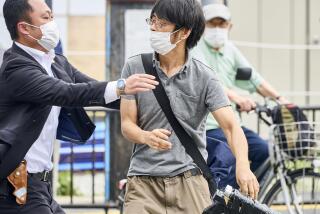Remains Found in High-Profile Japanese Crime Probe
- Share via
TOKYO — After a lengthy search that highlighted weaknesses in the Japanese criminal justice system, police on Friday announced the discovery of dismembered body parts believed to be those of a 22-year-old Briton missing since July.
The case of Lucie Blackman, which was front-page news here, focused attention on Japan’s heavy reliance on confessions to solve crimes. It also spotlighted a side of Japan not generally seen in tourist brochures--the seedy bars where illegal immigrants often walk a dangerous line in entertaining high-paying Japanese salarymen.
Blackman, a former British Airways flight attendant, came to Japan last May, moved into an apartment with another foreign woman and started working at the Casablanca hostess bar in Tokyo’s Roppongi entertainment district. Colleagues said she earned good tips and quickly developed several regular customers willing to pay the bar’s high cover charge.
On July 1, Blackman phoned a friend and said she was driving to the coast with a customer and would return shortly. She was never heard from again. The roommate received a call a few days later from an unidentified man saying Blackman had joined a cult.
Japanese police were unable to come up with many leads. Blackman’s family made repeated trips from England, distributed thousands of flyers, set up a hotline, offered a $150,000 reward and even elicited the help of Prime Minister Tony Blair, who raised the issue with Japan’s premier on a visit here.
Tim Blackman, Lucie’s father, accused police of being corrupt, incompetent and wary of upsetting the cozy and profitable world of Japanese hostess bars.
Other allegations that surfaced after the publicity over the Blackman case prompted investigators to focus on Joji Obara, a wealthy 48-year-old real estate developer with an apparent penchant for foreign hostesses.
He was taken into custody Oct. 12 and has since been charged with the rapes of five foreign and Japanese women. One case, filed two weeks ago, involves an incident that allegedly resulted in the death of an Australian woman in 1992.
Prosecutors allege that Obara would invite his victims to his condominium southwest of Tokyo, often offering them cell phones as gifts, then spike their drinks and rape them, all of which they say he recorded on nearly 100 videotapes found in the condominium.
A Tokyo police official, who declined to be identified, said today that the body parts found Friday in a small cave in Miura City southwest of Tokyo are those of a tall woman and included a decomposed head encased in concrete. Investigators are performing DNA tests and checking dental records, he added. Japanese newspaper reports say police believe that the body is Lucie Blackman’s.
Obara, who went on trial for other rape cases in December, has not been charged in the Blackman case and has maintained his innocence of all charges. In a statement made through his lawyers in November, he said he had met Blackman but didn’t have any knowledge of her disappearance.
The case has raised questions about the methods of Japanese police, whose reputation already has been battered by corruption and incompetence scandals.
Police in Japan have broad powers, can severely restrict a suspect’s access to lawyers and are allowed to keep a suspect in custody for more than 20 days without filing formal charges.
They also rely heavily on confessions exacted during long questioning sessions with a suspect but tend to have less experience building a case without the suspect’s cooperation. And most accused in Japan ultimately confess. But Obara has denied the charges and claimed that the incidents were the result of consensual relationships.
A few weeks after Blackman disappeared, it eventually came out, police were called to Obara’s condominium by the landlord after Obara reportedly insisted on changing the locks.
There they reportedly found cement on his hands and learned from neighbors that he had suddenly bought a boat and had been seen late at night with a shovel. Yet it evidently took them seven months to fully investigate the seaside cave site of Friday’s grisly discovery, just 250 yards from Obara’s condominium. The Asahi newspaper quoted police as saying that they explored the area last year but that “the site was so grassy and littered with rubbish, and in addition there might be snakes.”
Police earlier denied being able to trace the final call made to Blackman’s roommate about her joining a cult, but they revealed Friday that they have known for some time that it came from Obara’s mobile phone.
More to Read
Sign up for Essential California
The most important California stories and recommendations in your inbox every morning.
You may occasionally receive promotional content from the Los Angeles Times.












